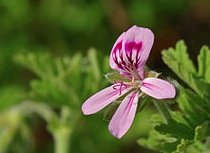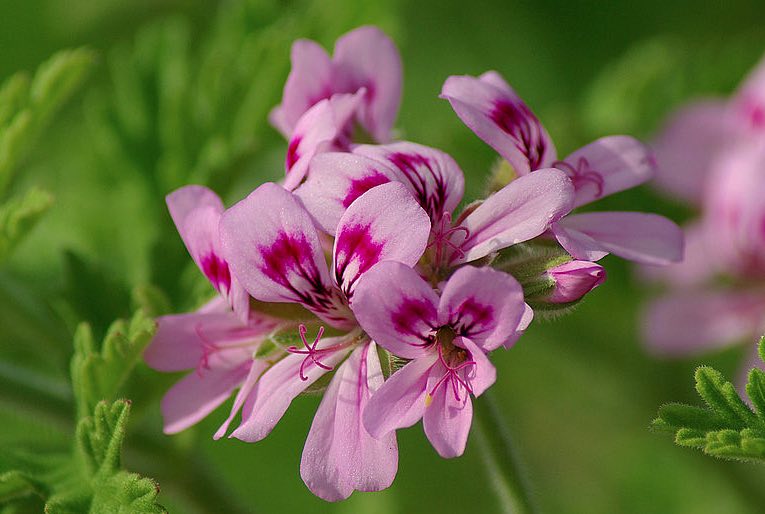Geranium Essential Oil
Geranium (Pelargonium graveolens) is used to extract the geranium essential oil.
A perennial shrub that is endemic to Southern Africa, from which many different varieties have been created over the years.
Geranium essential oil vs artificial perfume
We choose to use the geranium essential oil in our sunscreen instead of any artificial perfume because of a multitude of reasons that include:
Safety
Made without any of those hidden nasties you find in a perfume, natural fragrances can be absorbed into your skin without causing you any harm.
Hypoallergenic
Forget rashes and breakouts, this natural essential oil is kind to your skin
Eco-Friendly
Made with an ethically sourced ingredient, without any petroleum derivatives, this natural fragrance is gentle on the environment as well
Aromatherapy Benefits
Geranium essential oil is used to treat acne and for sore throats. With its uplifting qualities, it is used to treat anxiety and depression, as well as calming for insomnia.
Smells Amazing!
While synthetic perfumes mask the natural smell of your skin, natural essential oils create a more personal and unique scent, depending on the wearer. Made with a pure, genuine floral and herbal ingredient, it smells so original and not artificial.
What’s Hiding in that Perfume?
What synthetic nasties may be lurking in perfume? These are some common ingredients found in ordinary fragrance blends, to explain further why we choose a natural geranium essential oil instead:
Parabens
These are synthetic preservatives, known for disrupting your body’s hormone balance
Phthalates
These are used specifically in fragrance preservatives, and are to be found in high concentrations in most commercial perfumes. Phthalates are known carcinogens and endocrine disruptors.
Petrochemicals
Compounds derived from petroleum and natural gases, they are highly energy-intensive to produce, so they’re bad for the planet. Most noteworthy where we are concerned, they can trigger allergic reactions like eczema and rashes or even asthma, so they’re just not viable in our sunscreens.
Geranium essential oil origins
Geranium (Pelargonium graveolens) is a perennial shrub that is endemic to Southern Africa, from which many different varieties have been created over the years.
Pelargonium graveolens has small pink flowers with pointy leaves. The essential oil is extracted through a steam distillation of the stems and leaves only. The aroma can vary somewhat as the harvest of young green leaves will result in a lemony scent, whereas if older leaves are harvested with a different colour, the scent will resemble that of a rose.
The plants originated from South Africa, as well as Reunion, Madagascar, Egypt and Morocco and were introduced to European countries such as Italy, Spain and France in the 17th century.
There are about 700 different varieties of the plant, yet only 10 supply essential oil in viable quantities, as the normal garden geranium produce far too little oil for extraction.
In early times geraniums were planted around the house to keep evil sprits at bay

Geranium essential oil in aromatherapy
Geranium essential oil is often compared to the rose essential oil because they share almost the same therapeutic traits as well as the aroma.
The leaves and stalks are used for extraction, and the oil is obtained through steam distillation. The resultant oil is mostly without colour, but can have a slight light green colour to it.
Very popular in aromatherapy and natural skin remedies, it contains about 67 beneficial compounds:
- Main ones - citronellol (26.7 percent) and geraniol (13.4 percent).
- Others include - Nerol (8.7 percent), Citronellyl formate (7.1 percent), Isomenthone (6.3 percent), Linalool (5.2 percent)
In aromatherapy, geranium oil is used to help treat acne, sore throats, anxiety, depression and insomnia. It is popular among women due to its rosy smell and its beneficial effect on menstruation and menopause.
The essential oil can also aid in uplifting mood, lessening fatigue and promoting emotional wellness.
Geranium oil also functions to assist in pain reduction and inflammation.
Its antiseptic properties can help speed up the healing of wounds and treat a variety of skin problems, such as burns, frostbite, fungal infections, athlete's foot and eczema.
Benefits of geranium essential oil include:
- Fragrant scent: Besides the wonderful rose fragrance, it also helps combat body odour due to its antibacterial action.
- Helps in healing or fading scars and the removal of dark spots: by improving blood circulation just below the surface of the skin and promoting an equal distribution of melanin. This also helps with poor circulation and skin complaints such as bruises, broken capillaries, and burns.
- Beneficial in the treatment of acne, dermatitis and other skin diseases
- Astringent: soothing, refreshing and relaxing, it helps prevent skin problems like sagging and wrinkling, and helps give your muscles a toned appearance.
- Antibacterial, anti-fungal, and antioxidant properties: Prevents bacterial infections and boosts immune systems.
- Helps healing of wounds by triggering blood clotting, which also stops toxins from reaching your bloodstream through open wounds.
Possible Side Effects
Because Geranium is non-toxic, non-irritant, and non-sensitising, it is not known to cause any side effects.




